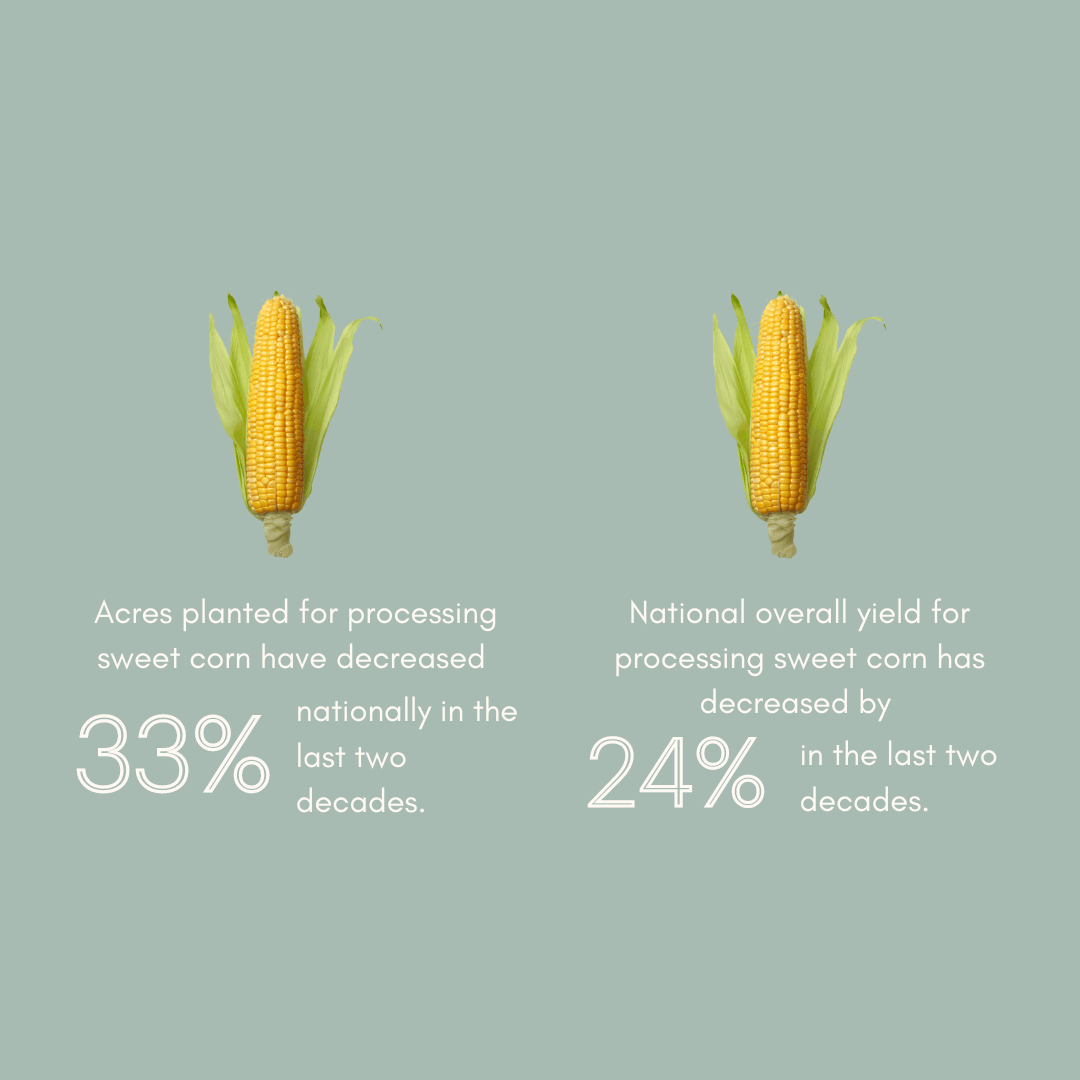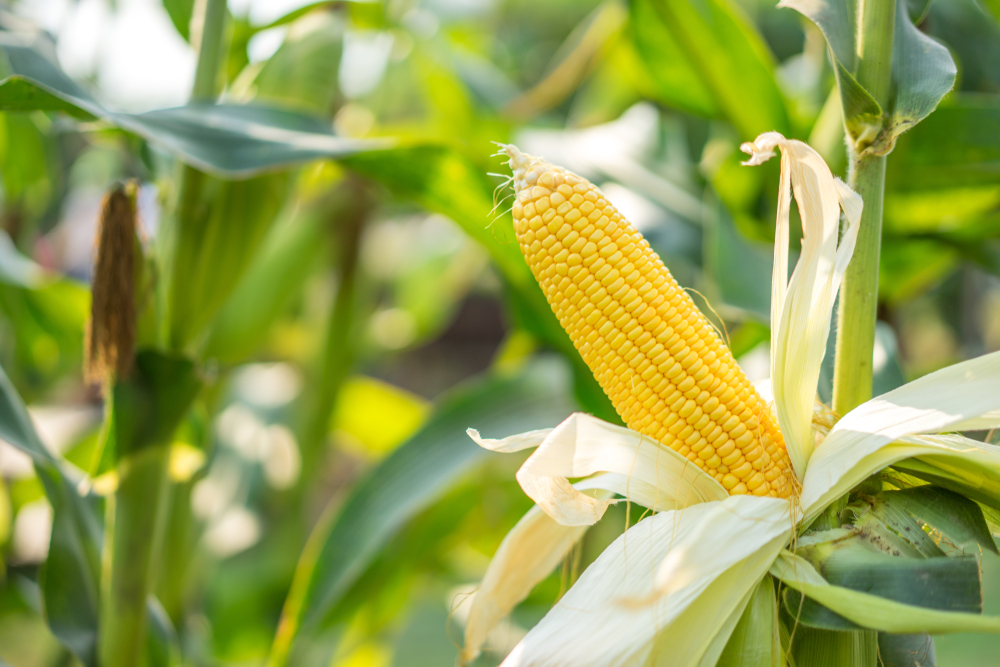Sweet Corn on a Decades-Long Decline
New research shows a drop in processing sweet corn production in the Midwest and Pacific Northwest over the past 27 years.
Sweet corn destined for the freezer or the canned food aisle has been steadily decreasing over the last three decades, according to a new study published in HortScience. Researchers from the University of Illinois Urbana-Champaign (UIUC) analyzed a 27-year data set spanning 20,000 sweet corn fields across four states. Between 1992 and 2018, this data set tracked things such as yield, acres planted and hybrid lifespan.
Over that time, processing sweet corn trends have seen an overall reduction in acres planted and in production. This study looked at trends independent of causes, but the researchers’ previous findings suggest a direct link to climate change, since higher temperatures were associated with drops in yield. The study also says that declines could also be partially consumer-driven. Since processing corn is grown for canning or freezing, not eaten fresh on the cob, a consumer preference for fresh corn could be contributing to the waning numbers.

The fields were grouped into five categories based on region and water sourcing—Illinois irrigated, Illinois rainfed, Washington irrigated, Minnesota rainfed and Wisconsin irrigated. The researchers saw a decline in acres planted in every category, and Wisconsin’s fields were the only ones to see an increase in yield. By the end of the data set, Wisconsin was producing more corn on less acreage than at the beginning of data collection. Although this study didn’t look at causation, this could possibly be linked to those fields being irrigated instead of rainfed.
“When you have some kind of extreme weather events, whether it’s excessive rainfall, excessive temperatures or temperatures and drought, those yield deviations are greatest under rainfed conditions,” says Martin Williams, ecologist with the US Department of Agriculture (USDA) Agricultural Research Service (ARS) and corresponding author of this study. Rainfed fields were more directly influenced by swings in the weather, particularly when it came to water supply. For example, the rainfed fields of Illinois saw the sharpest declines.
This is a big deal, says Williams, because the most important thing when it comes to processing sweet corn is consistency.
“You want those folks producing phenomenal yields and …know that they’re going to be able to deliver that,” says Williams. “(Instead of) something that deviates from what they’re expecting for the season.”
One potential avenue toward that consistency is continuing to improve the stress tolerance of the cultivars used. Commercial sweet corn operations use hybrid corn, which can be bred to meet environmental obstacles with more stability.
“You don’t necessarily need a flashy hybrid,” says Williams. “You want what they call ‘workhorse hybrids’ that do well, are less influenced by environmental swings and more hardwired to perform at a certain level.”
The cultivars in use now won’t necessarily be the ones performing well decades down the road, he says.
“It gives you a little pause—what do we need to be doing now so we can ensure profitability and productivity into the future?”
Follow us
This work is licensed under a Creative Commons Attribution-NoDerivatives 4.0 International License.
Want to republish a Modern Farmer story?
We are happy for Modern Farmer stories to be shared, and encourage you to republish our articles for your audience. When doing so, we ask that you follow these guidelines:
Please credit us and our writers
For the author byline, please use “Author Name, Modern Farmer.” At the top of our stories, if on the web, please include this text and link: “This story was originally published by Modern Farmer.”
Please make sure to include a link back to either our home page or the article URL.
At the bottom of the story, please include the following text:
“Modern Farmer is a nonprofit initiative dedicated to raising awareness and catalyzing action at the intersection of food, agriculture, and society. Read more at <link>Modern Farmer</link>.”
Use our widget
We’d like to be able to track our stories, so we ask that if you republish our content, you do so using our widget (located on the left hand side of the article). The HTML code has a built-in tracker that tells us the data and domain where the story was published, as well as view counts.
Check the image requirements
It’s your responsibility to confirm you're licensed to republish images in our articles. Some images, such as those from commercial providers, don't allow their images to be republished without permission or payment. Copyright terms are generally listed in the image caption and attribution. You are welcome to omit our images or substitute with your own. Charts and interactive graphics follow the same rules.
Don’t change too much. Or, ask us first.
Articles must be republished in their entirety. It’s okay to change references to time (“today” to “yesterday”) or location (“Iowa City, IA” to “here”). But please keep everything else the same.
If you feel strongly that a more material edit needs to be made, get in touch with us at [email protected]. We’re happy to discuss it with the original author, but we must have prior approval for changes before publication.
Special cases
Extracts. You may run the first few lines or paragraphs of the article and then say: “Read the full article at Modern Farmer” with a link back to the original article.
Quotes. You may quote authors provided you include a link back to the article URL.
Translations. These require writer approval. To inquire about translation of a Modern Farmer article, contact us at [email protected]
Signed consent / copyright release forms. These are not required, provided you are following these guidelines.
Print. Articles can be republished in print under these same rules, with the exception that you do not need to include the links.
Tag us
When sharing the story on social media, please tag us using the following: - Twitter (@ModFarm) - Facebook (@ModernFarmerMedia) - Instagram (@modfarm)
Use our content respectfully
Modern Farmer is a nonprofit and as such we share our content for free and in good faith in order to reach new audiences. Respectfully,
No selling ads against our stories. It’s okay to put our stories on pages with ads.
Don’t republish our material wholesale, or automatically; you need to select stories to be republished individually.
You have no rights to sell, license, syndicate, or otherwise represent yourself as the authorized owner of our material to any third parties. This means that you cannot actively publish or submit our work for syndication to third party platforms or apps like Apple News or Google News. We understand that publishers cannot fully control when certain third parties automatically summarize or crawl content from publishers’ own sites.
Keep in touch
We want to hear from you if you love Modern Farmer content, have a collaboration idea, or anything else to share. As a nonprofit outlet, we work in service of our community and are always open to comments, feedback, and ideas. Contact us at [email protected].by Lena Beck, Modern Farmer
July 20, 2023
Modern Farmer Weekly
Solutions Hub
Innovations, ideas and inspiration. Actionable solutions for a resilient food system.
ExploreExplore other topics
Share With Us
We want to hear from Modern Farmer readers who have thoughtful commentary, actionable solutions, or helpful ideas to share.
SubmitNecessary cookies are absolutely essential for the website to function properly. This category only includes cookies that ensures basic functionalities and security features of the website. These cookies do not store any personal information.
Any cookies that may not be particularly necessary for the website to function and are used specifically to collect user personal data via analytics, ads, other embedded contents are termed as non-necessary cookies.

The truth is most folks can’t stand corn anymore unless they grow it themselves. They see corn in general and think roundup ready or fungicide. They don’t want there sweet corn sprayed.
A major factor not mentioned is that processing plants have been closing ever since NAFTA was passed in 1994. The plants were heavily reliant on immigrant workers from Mexico and once the trade restrictions were eliminated it was more profitable to simply move production to Mexico and later to Central America than to bring workers to the Midwest and the Northwest. Also consumer preferences were changing with frozen vegetable consumption increasing and canned vegetable consumption decreasing. This meant that the canneries closed, and again the new frozen vegetable processing plants were often built south of the border.
Ensuring profitability and productivity is important, but don’t forget flavor! In order to get more product onto a larger truck and drive it to processing or selling point, Taste has been forgotten in so many products, and seemingly bred out in order to get them to a warehouse. If you want people to continue eating/purchasing your product it must taste good!
Consider those strawberries and tomatoes that people are trying to grow in their yards because the store-purchased ones have no flavor!!!
A 33% drop in total acres planted happened at the same time as a 24% drop in total yield. That is a 13.4% increase in production per acre planted. Is that a problem?
The problem with corn is corn syrup and the fact that it is in evetything.
A misleading title. Sweet corn is not really on a decline. It’s frozen and canned sweet corn that is on a decline. This is a reflection of consumers shifting from processed vegetables in general to fresh. Canned and frozen vegetables are on the decline in general, as more are buying fresh product.
Farmers have been cultivating maize in India for a long time, we have not found a suitable market for it where farmers can get good prices for maize.
I grow sweet corn myself. If I buy it, I buy local. Much better than processed.
Quit giving us feed corn for consumption.
The corn they sell today versus when we had field seed instead of this gmo junk was more nutritional, soft, and sweet. Even the feed corn back in the day was better than the junk they try to convince you 8s real corn.
Man messed with it and took the perfection right out of it!